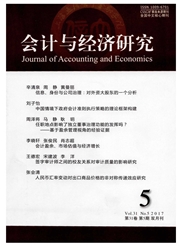

 中文摘要:
中文摘要:
在证券法律体系已经相对比较完备的情况下,执行问题成了学者们关注的焦点。现实中的证券法律执行,经常是执法者在不同时期、针对具体情形有选择性地采取不同的执行强度,即选择性执行。基于IPO核准的经验研究发现,市场低迷阶段的IPO核准速度较慢,这对来自所在辖区政治地位较高地区的公司更为明显;进一步引入发行市盈率后研究发现,市场低迷、所在辖区政治地位较低、发行核准越慢的公司,其发行市盈率越低,但所在辖区政治地位较高地区的公司发行市盈率没有显著更低,在市场繁荣时期却表现出相反的结果。研究结论为理解转型经济中政府管制选择性执行的状况、路径和经济后果提供了一个有益的视角。
 英文摘要:
英文摘要:
When the securities law system becomes complete,the enforcement has become the focus of scholars. The selective enforcement refers to the situation that the executors often take different enforcement strength in different times and towards different cases.According to the empirical research in IPO approval,the approval rate of IPO in the market downturn phase tends to be slower,which is more salient with the firms from the areas with high political status. The further study indicates that the IPO price-earnings ratio is negatively associated with the high market downturn,the area with low political status and the length of IPO approval of the firm. However,in the areas with high political status,the price-earnings ratio is not significantly reduced. Such an effect is opposite in the market boom phase. The findings provide a useful perspective for understanding the situation,path and economic consequences of the selective enforcement in the transitional economy.
 同期刊论文项目
同期刊论文项目
 同项目期刊论文
同项目期刊论文
 期刊信息
期刊信息
